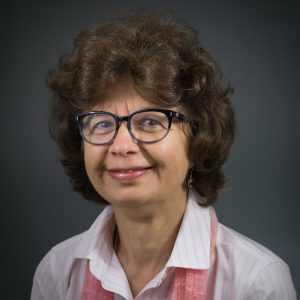Perver Baran

Bio
Education
Ph.D., Urban Planning, Istanbul Technical University, Istanbul, Turkey.
Master of Urban Planning, Istanbul Technical University, Istanbul, Turkey.
Bachelor of Architecture, University of Kiril i Methodij, Skopje, Yugoslavia.
Current Research Interests
- Built environment and health
- Geographic Information Systems (GIS)
- Immersive virtual environments
Recent Courses Taught
- GIS 515: Cartographic Design
- GIS 520: Spatial Problem Solving
Publications
- Augmented reality participatory platform: A novel digital participatory planning tool to engage under-resourced communities in improving neighborhood walkability , Cities (2023)
- Classification of tree forms in aerial LiDAR point clouds using CNN for 3D tree modelling , International Journal of Remote Sensing (2023)
- Spatially disaggregated simulation of interactions between home prices and land-use change , Environment and Planning B Urban Analytics and City Science (2022)
- Neighborhood Dynamics and Long‐Term Change , Geographical Analysis (2020)
- Modeling restorative potential of urban environments by coupling viewscape analysis of lidar data with experiments in immersive virtual environments , Landscape and Urban Planning (2019)
- Rural tourism microentrepreneurs’ self-representation through photography: a counter-hegemonic approach , Rural Society (2019)
- An exploratory study of perceived safety in a neighborhood park using immersive virtual environments , Urban Forestry & Urban Greening (2018)
- Exploring perceived restoration potential of urban green enclosure through immersive virtual environments , Journal of Environmental Psychology (2018)
- Spatial distributions and use patterns of user groups in urban forest parks: An examination utilizing GPS tracker , Urban forestry & urban greening (2018)
- Can trail spatial attributes predict trail use level in urban forest park? An examination integrating GPS data and space syntax theory , Urban forestry & urban greening (2017)
Grants
This project will establish a partnership between the Center for Geospatial Analytics at NC State University and the Wake County Innovation Lab to form a team to develop geospatial visualizations and analytics solutions for internal and external Wake County government stakeholders. This effort will support projects for the Wake County Innovation Center / GeoLab that require specialized computational skillsets. Overall, the objective of the project is to develop solutions in emerging geospatial technologies, to contributing high-level geospatial science and computational skills, to the advancement of Wake County Innovation Lab application development and delivery, and to increase the geospatial analytical capabilities that the Innovation Lab provides to departments and stakeholders. The research group will focus on geospatial analytics and the development of visualizations and applications to model spatial solutions for county operations and engagement with citizens. Pilot projects may include augmented reality, BIM (Building Information Modeling) and the incorporation of sensor data streams. This project is intended to enhance the potential for Wake County Innovation Lab staff to make tangible progress on enhancing the geovisualization and geoanalytics in application development and delivery.
The objective of this project is to evaluate the state-of-the art tools for developing a 3D interactive web application that will allow the staff and public (i) to view and gather reporting analytics on various precomputed zoning scenarios and compare to current as-built conditions, and (ii) to interactively change the 3D properties of the buildings within the 3D web environment. The evaluation will incorporate a prototype application demonstrating the possibilities of next generation planning using 3D city models.
The National Urban and Community Forestry Advisory Council identified public health impacts of urban forests as a research priority. Two of the ten leading public health challenges in the U.S. are physical inactivity and obesity. Studies of the built environment show that community design and urban form shape opportunities for physical activity. Few studies have examined the specific contributions that urban and community forests make to public health through physical activity. This study proposes to examine the potential for urban forests to promote physical activity and health. A multidisciplinary team of researchers will compile and integrate national epidemiologic and health surveillance data with data from urban forest inventory databases to examine relationships among urban forest characteristics and physical activity and health. One level of analyses will examine these relationships between cities, exploring national trends. A second level of analysis will employ higher resolution data to focus on three metropolitan areas to determine the relative influence of urban forest characteristics, community design, and population characteristics on physical activity and obesity. Results of the study will be of great interest to policy makers and professionals working in the natural resources and public health arenas.